Matt Rees's Blog - Posts Tagged "arabs"
Global Post features my articles on Nablus, the Samaritans from my new novel
The new U.S. website Global Post, which aims to provide Americans with the foreign news that they're missing since their newspapers fired almost all their international correspondents, features a series of stories by me. They're intended as introductions to my new Palestinian crime novel, THE SAMARITAN'S SECRET -- colorful features about life for the Palestinians who appear in the book. The second article tells how I came to know the remnants of the ancient Samaritans, living on a hilltop overlooking Nablus. Both articles include photographs I took of Nablus and links to video about the novel.
Published on February 22, 2009 03:22
•
Tags:
arabs, east, good, jesus, middle, palestine, palestinians, samaritan, samaritans
Global Post: Bibi in a corner
Obama presses Israeli Prime Minister Netanyahu to stop building in West Bank settlements. By Matt Beynon Rees - GlobalPost May 26, 2009
JERUSALEM — One morning late last week, Israeli Border Police showed up at Maoz Esther, an outpost of Israeli settlers in the West Bank near Ramallah. They waited for a Bible study class to finish, tore down the settlers’ five little shacks and ran the residents off.
A few hours later, the settlers returned, nailing together the battered pieces of drywall shunted aside by the government. Maoz Esther rose again.
This kind of half-hearted approach to clearing out illegal outposts is the way Israel has always handled the settlers. Read more...
JERUSALEM — One morning late last week, Israeli Border Police showed up at Maoz Esther, an outpost of Israeli settlers in the West Bank near Ramallah. They waited for a Bible study class to finish, tore down the settlers’ five little shacks and ran the residents off.
A few hours later, the settlers returned, nailing together the battered pieces of drywall shunted aside by the government. Maoz Esther rose again.
This kind of half-hearted approach to clearing out illegal outposts is the way Israel has always handled the settlers. Read more...
Everyone comes back to Jerusalem
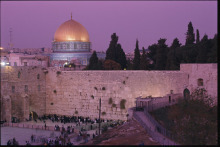 Everyone comes back to Jerusalem. I don’t know why, for the life of me I really don’t.
Everyone comes back to Jerusalem. I don’t know why, for the life of me I really don’t.It’s much too hot. The people can be offhandedly mean, and they drive as though they want to kill you. It isn’t a very pretty place once you look close. Oh and, yes, sometimes it gets violent. With jaw-dropping self-obsession, it thinks the eyes of the world are turned admiringly upon it all the time.
Jerusalem sometimes seems like that inexplicably popular idiot everyone liked in high school. Exerting a stupefying magnetism over people with otherwise solid judgment.
I’ve been in Jerusalem 14 years. I’m under no illusions as to what keeps me here. I’ve made a good life for myself with good friends, and the place provides me with the material for my writing.
But I’m rather immune to its other supposed charms. It’s no Tuscany.
Yet all my journalist pals have come and gone – and come back again. I’ve been here so long, everyone to whom I’ve said goodbye ends up dropping in for dinner once more. It wouldn’t happen if I went back to live in Wales. No one is drawn there with idealistic visions of its sublimity…
I spoke to a writing group in the center of Jerusalem last week. Lovely people the lot of them. Mostly young Americans or Canadians, Brits and South Africans who’ve immigrated recently to Israel and want to get together with writers of a similar background. All of them so devoted to Jerusalem.
To some degree, each of them has to live here a while to see beyond the newness. They’re experiencing the same happiness I recall when I arrived at university and discovered a kind of freedom and belonging I’d only before imagined. Until then, they’ll write about Jerusalem in the tones of the biblical psalmist, making of the city a personified lover, the object of desire and devotion.
That isn’t how I see the place. I’ve lived through an intifada, seen Jerusalem mangle the bodies of its peoples and accept the spray of hateful slogans on its walls. I’ve been called all kinds of names by all kinds of people and sued by some particularly unreasonable ones. I’ve come close to being run down on crosswalks by angry Israeli drivers and shoved aside in the Old City by angry hashish-raddled Palestinians.
For a while all that made me angry too. Not so angry that it overcame the feelings of creativity it gave me. There’s a certain anger – spun forward and made pro-active, positive – at the heart of Omar Yussef, the hero of my Palestinian crime novels.
Why didn't I keep on getting angry? Because I discovered I liked the hash-tokers of the Muslim Quarter rather better than I enjoyed the company of the politicians or professional classes I met as a journalist.
That’s one of the main reasons I write crime novels about this place. Crime novels are the opposite of idealization. They see “the skull beneath the skin,” as Eliot wrote of John Webster (a playwright I recommend to anyone who likes a bit of morbid, cynical straight-talk).
It isn’t that I take a negative view of Jerusalem and its environs. I long ago realized that I continue to live here because there’s something I like about it, and its people. Just not in a romanticized way. It’s simply because I’ve come to understand the ways in which the people and their city push each other to the edge of existence. It’s when they’re on the edge that I find out what really counts for them.
And for me.
(I posted this today on International Crime Authors, a joint blog I do with some other...well, crime authors, obviously.)
Published on January 21, 2010 01:36
•
Tags:
arabs, bible, crime-fiction, islam, israel, israelis, jerusalem, jews, journalism, muslims, palestine, palestinians, psalms, writing
Jerusalem Zoo: Penguins before pols
Here's a whimsical video explaining why the Jerusalem Biblical Zoo is the best vantage point from which to observe the Palestinian-Israeli conflict -- superior even than a Gaza refugee camp or an Israeli military base. Seriously. And yet not.
Published on February 11, 2010 00:55
•
Tags:
animals, arabs, crime-fiction, fish, global-post, israel, israeli-palestinian-conflict, jerusalem, jerusalem-biblical-zoo, journalism, leopards, lions, matt-beynon-rees, middle-east, palestine, penguins, politicians, politics, sara-sorcher, terrorism, tigers, ultra-orthodox-jews, video
An Islamic Romeo and Juliet
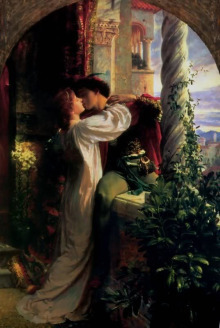 Since 9/11, journalists and writers have tried to make sense of the extremists committed to the destruction of the West and, often, that of their own societies in the Middle East. Mostly this has meant “going inside” the world of those extremists, giving us the inner life of suicide bombers or of the “American Taliban.”
Since 9/11, journalists and writers have tried to make sense of the extremists committed to the destruction of the West and, often, that of their own societies in the Middle East. Mostly this has meant “going inside” the world of those extremists, giving us the inner life of suicide bombers or of the “American Taliban.”It’s a worthy premise, because it’s aimed at comprehending people who are frequently written off as bestial, bloodthirsty psychopaths, as though they’d been born that way. As a journalist with 14 years experience in the Middle East, I’ve written such stories often enough. But in my new novel I decided to highlight the desperate world of Arabs who struggle against the extremism that drags them toward their inevitable, tragic end. This is the most profound way of humanizing Arabs, because it shows them clinging to the very things that make them just like us, rather than succumbing to the ugliness of a politics that sets them against us.
That’s why I see my new crime novel, “The Fourth Assassin,” as an Islamic “Romeo and Juliet” set in the context of a political assassination plot in New York. I want to put a human face on Arabs, who’re so often seen as stereotypical terrorists. But I want to focus less on the pain and confusion that leads to hatred, and instead to reveal the love that can provide hope for Arab people in the face of so much destruction and division. To illustrate, for Western readers, what they’re up against, too.
“The Fourth Assassin” begins with Omar Yussef, the hero of my previous three Palestinian crime novels, arriving in New York for a UN conference. He uncovers an assassination conspiracy involving some of his former pupils from back home in Bethlehem. It unfolds in the neighborhood of Brooklyn called Bay Ridge. With its growing Palestinian community, Bay Ridge is in fact becoming known as “v”.
As he delves into the background of the plot, Omar looks for political explanations. That’s what journalists and writers typically do when they examine the Middle East. But gradually Omar sees that there’s a love story behind what’s happening. A love story between a young Sunni Muslim who has been sucked into the assassination plot and a Lebanese Shia girl who wants to enjoy the freedoms of American life.
The book’s a crime novel, so I’m not giving anything away when I say that Omar sees these lovers as tragic, somehow doomed by the politics around them. But he acknowledges – as the lovers do – that their human connection is so important that it’s worth any sacrifice. Just as Romeo does when he rails against the family politics that would deny him his Juliet and designate such divisions as fated. “Then I defy you, stars,” he calls out.
With Romeo and Juliet, the doom that surrounds them isn’t the point of the play. It’s their hope and defiance that draws them to us. If Shakespeare had written a three-hour examination of the political conflict between the Montagues and the Capulets, I don’t expect we’d pay it much attention these days. Neither would we be interested in the play had it focused on Tybalt, Juliet’s hot-headed, murderous cousin, or Mercutio, the pal of Romeo who shouts “a plague on both your houses” as he dies. Yet that’s exactly what journalists and writers give us in their attempts to “explain” the Arab world.
Love is what helps us to understand those who seem otherwise to be set against us. That’s what Omar Yussef learns in “The Fourth Assassin.” I hope the novel will help my readers see that love is as much a part of life for Arabs as the violence that dominates their portrayal in the news pages.
Published on April 02, 2010 02:05
•
Tags:
9-11, american-taliban, arabs, bay-ridge, bethlehem, brooklyn, crime-fiction, islam, lebanon, middle-east, montagues-and-capulet, new-york, omar-yussef, palestine, palestinians, romeo-and-juliet, shakespeare, taliban, the-fourth-assassin
How to avoid writer's block
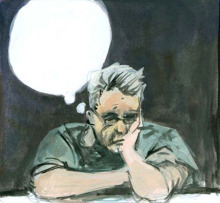 Writer’s block has nothing to do with writing.
Writer’s block has nothing to do with writing.That might seem obvious. When a writer wants to write, but can’t get anything out, he’s blocked. Not writing. Blocked.
But it isn’t the writing that causes the block. Neither is it some psychological problem or an inability to conjure up the Muse of inspiration.
It’s because the writer didn’t put everything on little index cards first.
Read the rest of this post on my blog The Man of Twists and Turns,a/>.
Published on June 06, 2010 06:10
•
Tags:
arabs, crime-fiction, fatah, gaza, hamas, israeli, jews, matt-beynon-rees, middle-east, palestinian, writer-s-block, writers, writing
New West Bank road to peace?
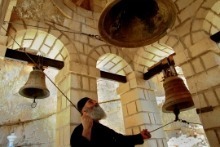 ST. GEORGE’S MONASTERY, West Bank — Gathered in the chapel of this outpost in the Judean Desert last week, the Orthodox priests chanted “Lord, have mercy” in Greek, in a service of blessing for a new road that makes the venerable building accessible to the growing number of tourists willing to dare a visit to the troubled Holy Land.
ST. GEORGE’S MONASTERY, West Bank — Gathered in the chapel of this outpost in the Judean Desert last week, the Orthodox priests chanted “Lord, have mercy” in Greek, in a service of blessing for a new road that makes the venerable building accessible to the growing number of tourists willing to dare a visit to the troubled Holy Land.As far as the Palestinian Authority is concerned, the priests may as well have been speaking, well, Greek. Because the road was built by Israel over land the Palestinians consider their own, officials in Ramallah condemned the priests’ participation in the road’s inauguration ceremony.
Palestinian Prime Minister Salam Fayyad “expressed surprise” that the Orthodox priests joined the director-general of the Israeli Tourism Ministry Tuesday at the monastery, which clings to a cliff side over Wadi Qelt, a deep canyon running down to the Jordan Valley. Another Palestinian minister said the monks’ presence “gave a deceiving impression” about the status of the land around St. George’s.
Like other stretches on the rocky road that still clings to the misnomer “peace process,” the Palestinian protest will fade like a mirage in the desert surrounding St. George’s. More important in the end is the (literally) concrete path laid out for pilgrims to visit one of the most important and most beguilingly beautiful sacred sites in the Holy Land.
Archbishop Aristarchos, the secretary of the Greek Orthodox Patriarchate in Jerusalem and the leader of the brief prayer service, was diplomatic in his comments, when asked about Palestinian complaints over the road.
“This is a monastery of prayer for peace in our region, for peace in the Holy Land,” Aristarchos said. “The road brings full access for pilgrims who are messengers of peace to the Holy Land.”
The $500,000 road cuts over from the main Jerusalem-Jericho highway in front of the entrance to an Israeli settlement. It snakes around dusty dunes and dry wadis. To the east, the view is hazy down over the Jordan Valley to the mountains rising in the Hashemite Kingdom. After a 10-minute drive, visitors arrive at a parking lot.
Read the rest of this post on my blog
Published on December 13, 2010 08:16
•
Tags:
arabs, bethlehem, christians, churches, greek-orthodox, holy-land, israel, israeli-tourism-ministry, israelis, jericho, jerusalem, jews, jordan-valley, judean-desert, nazareth, palestine, palestinians, salam-fayyad, st-george-s-monastery, wadi-qelt, west-bank
Bethlehem upbeat for Christmas
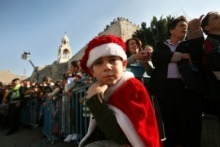 For the first time in years, the people of Bethlehem have something more to celebrate at Christmas than the recollection of an important birth in their town 2,000 years ago.
For the first time in years, the people of Bethlehem have something more to celebrate at Christmas than the recollection of an important birth in their town 2,000 years ago.After the city’s economy was devastated by the Palestinian intifada over the last decade, Bethlehem’s economic recovery has picked up pace in the last year with gross domestic product rising by 9 percent. This Christmas the city’s streets are packed with tourists and pilgrims, and if the holy family were to arrive today they would, once more, discover that there’s no room at the inn — Bethlehem’s hotels are filled to capacity.
Locals see this as an important marker on their road back to normality. “Tourists are coming. Things are all right in Bethlehem,” said Walid Zawahra, a taxi driver.
Zawahra stood beside his yellow Mercedes cab, watching tourists pour through the massive gate in Israel’s security wall around Bethlehem. The gate is opened only once a year, for Christmas, so that the Roman Catholic Patriarch can enter in procession with his entourage from Jerusalem. The rest of the year, visitors must pass through a smaller entrance at the nearby checkpoint.
Security remains a factor, however. The streets beyond the gate were closed to traffic. Palestinian security forces were out in force on the roads around Rachel’s Tomb, which Jews believe to be the site of the burial of the biblical matriarch and where Israeli soldiers still stand guard. The tomb, which has taken on the dimensions of a fortress in the last decade, is a frequent point of friction between the soldiers and Palestinian rioters, and the authorities don’t want Christmas marred by any violence.
The Church of the Nativity, which stands over the site of Jesus’s birth, opened Friday after a 24-hour security closure, as police swept it for bombs before the Patriarch’s arrival for Midnight Mass.
In Manger Square, outside the church, two new cafes have been doing a bumper business, hosting local families and tourists late into the night. A stage built against the buttresses of the Armenian monastery at the front of the church hosted live musical performances in the evening.
The Bethlehem area also has something novel to entertain its young people — namely, something to do after dark. Until recently, youngsters in Bethlehem complained that their city shut down at twilight. Two night clubs opened in the last few months in the largely Christian district of Beit Jala. One of them is named Taboo, because it serves pork and, therefore, contravenes the proscriptions of Islam by which most West Bank restaurants operate.
Read the rest of this post on my blog The Man of Twists and Turns.
Published on December 25, 2010 01:45
•
Tags:
arabs, beit-jala, bethlehem, christians, christmas, global-post, intifada, jesus, journalism, manger-square, middle-east, nativity-church, palestine, palestinians, rachel-s-tomb, roman-catholic, west-bank
For Arabs: democracy, then crime fiction
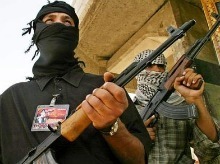 Crime fiction may not be the first thing on the minds of the protesters taking to the streets for democracy across the Arab world. But one of the offshoots of the downfall of Arab dictators is sure to be an explosion of thrillers and mysteries.
Crime fiction may not be the first thing on the minds of the protesters taking to the streets for democracy across the Arab world. But one of the offshoots of the downfall of Arab dictators is sure to be an explosion of thrillers and mysteries.Until now there has been almost no crime fiction written in Arabic. A couple of little-known writers in Egypt and Morocco have contributed old-fashioned Agatha Christie-style cosies (“One of the people at this oasis is the killer.”) The best Arab detective writer has been Yasmina Khadra, whose series about Inspector Llob is supremely gory and noirish. But Khadra writes in French from exile in France.
I believe Arabs have eschewed crime writing because it’s a democratic genre. One man wants to find out something that a big organization – the CIA, the mafia, the government – wants to keep secret. It’s easy to see why Hosni Mubarak probably wasn’t a fan of Raymond Chandler.
For people who live in democracies, it’s easy to find fiction credible that suggests a man can investigate – and once he fingers the bad guy, the bad guy will be punished. That’s why Scandinavian crime fiction by Henning Mankell et al is so popular: the Nordic societies have us all convinced that an eruption of violence, crime or murder, will soon enough be resolved and life can go back to its usual extreme orderliness.
Not so for the Arab world. Arabs have a deep sense of fatalism. Not only do they lack faith that the bad guy will be punished, they’re quite sure the bad guy will prosper. He’ll drive his Mercedes to his villa directly from the government offices or state-run companies where he rakes off his big take. The ordinary guy will be left to live on $2 a day.
When I came to write my series of Palestinian crime novels, one of the challenges was to make the format of the crime novel work in an environment where law and order didn’t really function or protect ordinary citizens. I did it by demonstrating that while my sleuth, Omar Yussef, might nail one bad guy at the end of the book, he would be left with an awareness that there were many other guilty men who had escaped him. As one German reader put it to me at a book festival, “I like your books because, in the end, everyone’s guilty.” The reason people across the Arab world are rising up is because they don’t want to share the guilt and shame of their broken, repressed societies any more.
Read the rest of this post on my blog The Man of Twists and Turns.
These observations are true even for countries where there isn’t what we’d call a Western-style democracy – which I’d characterize as a democracy where corruption is either extremely well-hidden or disguised as a stock market in which all can supposedly participate. Take Russia, for example. Clearly not the democracy its people might dream of. But nonetheless one in which opposition journalists – at considerable risk to themselves – do function in the face of the state apparatus and its corrupt overlords.
In South Africa, there was almost no local crime fiction under apartheid. When that changed, there was an explosion of crime writing.
The situation in the Arab world is changing now. Which shows that there’s a thirst for democracy, for accountability – and, therefore, for crime fiction.
Published on February 24, 2011 00:55
•
Tags:
agatha-christie, arabs, crime-fiction, democracy, henning-mankell, hosni-mubarak, middle-east, omar-yussef, raymond-chandler, writing, yasmina-khadra
My burst Jerusalem bubble
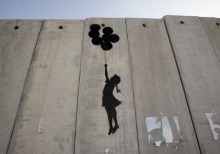 My taxi pulled up at the traffic lights on the way into Jerusalem late Sunday night. A half dozen Breslav hassids were bouncing up and down in front of the traffic, waving signs and grinning with the exultation of wedding party dancers. They were singing, “Death to the Arabs.”
My taxi pulled up at the traffic lights on the way into Jerusalem late Sunday night. A half dozen Breslav hassids were bouncing up and down in front of the traffic, waving signs and grinning with the exultation of wedding party dancers. They were singing, “Death to the Arabs.”Welcome home, I thought. Something dark descended on me. I’d been away for a week attending a literature festival in Dubai. I’d become close – quickly, as can often happen at a conference which keeps you within the confines of a hotel for many days – with a number of exiled Palestinian writers who initially wanted to chat with me about my Palestinian crime novels. As the car beside my taxi honked its horn in time to the murderous chant, I thought of those writers, those beautiful, intelligent souls, and soon enough I found a way out of the darkness.
I’ve made a bubble for myself in Jerusalem. I’m neither Israeli nor Palestinian. I admit that I don’t really participate in either culture. I’ve enjoyed that detachment, because it leaves me to focus on my writing, free of distractions such as caring what the hell happens around me.
In this case, the bubble burst. I had to decide what I would let in through those fractured defenses. Would it be negativity, anger at the jumping scum at the traffic lights whose idea of a response to the slaying of an Israeli family in a settlement near Nablus two nights before was to call for more blood? No, I knew I could fill the space with the books of the Palestinian writers I had met while I was in Dubai.
For the rest of this post read my blog The Man of Twists and Turns.
The sensitive creativity of Susan Abulhawa, whose “Mornings in Jenin” is as powerful a rendering of the disasters of recent Palestinian history as has ever been written, with a universal, human quality of great rarity. The poetry of Nathalie Handal, politically committed and yet mystical. Or Raba’i al-Madhoun, who wrote “The Lady from Tel Aviv,” engaging with Israel and what it has meant in his life, rather than wishing for death to its people.
Thanks to them, I’ve never felt more strongly that literature is the power in my life. Because its subtlety overwhelms the ugly, one-way thinking of politics.
Graham Greene wrote that “when you’ve lived in a place for a while, you cease to read about it” (“The Quiet American”.) That had happened to me, too, here in Jerusalem. It’s been a while since I read much Palestinian or Israeli literature. I think that was a mistake. It meant that my perception of the people who lived around me was too much colored by the stupid politics, by the bouncing fools who want the other guys to die so they can do as they wish.
That won’t happen again.
Published on March 17, 2011 04:59
•
Tags:
arabs, graham-greene, israel, israelis, jerusalem-dubai, jews, literature-festival, nathalie-handal, palestine, palestinians, raba-i-al-madhoun, susan-abulhawa



